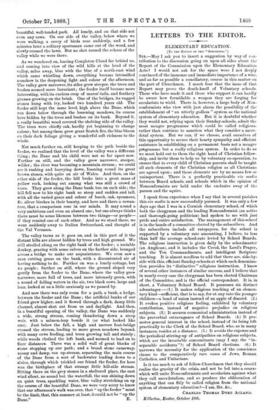LETTERS TO THE EDITOR.
ELEMENTARY EDUCATION.
[To THE EDITOR OF THE " SPECTATOR:1
SIR,—May I ask you to insert a suggestion by way of con- tribution to the discussion going on upon all sides about the Report of the Commission upon the Elementary Education Acts? I would not ask for the space were I not deeply convinced of the immense and immediate importance of a wise, and as far as possible a conciliatory, course in this matter on the part of Churchmen. I much fear that the issue of that Report may prove the death-knell of Voluntary schools. Those who have made it and those who support it can hardly be aware how formidable a weapon they are forging for secularists to wield. There is, however, a large body of Non- conformists who view with just alarm the possibility of the establishment of "an utterly godless " system as the national system of elementary education. But it is doubtful whether they would not, relying upon their Sunday-schools, admit the most meagre programme which could be called religious, rather than continue to sanction what they consider a sacer- dotal system. But we can, if we choose, avail ourselves of this opportunity to secure their hearty sympathy and efficient assistance in establishing on a permanent basis not a meagre programme but a really religious system. In order to do so we must hold out to them the right hand of Christian fellow- ship, and invite them to help us by voluntary co-operation, to ensure that to every child of Christian parents shall be taught all such elements of the Christian religion as all Christians are agreed upon ; and those elements are by no means few or unimportant. There is a perfectly practicable via media between Board schools, and schools which in the opinion of Nonconformists are held under the exclusive sway of the parson and the squire.
I speak from experience when I say that in several parishes this via media is now successfully pursued. It was only a few days ago that I was in a Cornish elementary school, of which both the clergyman and the leading Nonconformist (an active and thorough-going politician) had spoken to me with just pride and entire satisfaction. The management of this school is in the hands of a committee elected by the subscribers. And the subscribers include all ratepayers, for the school is supported by a voluntary rate amounting, I believe, to less than half the average school-rate levied by School Boards. The religions instruction is given daily by the schoolmaster (an Anglican), and it includes the Creed, the Lord's Prayer, and the Ten Commandments, and intelligent Scripture teaching. It is almost needless to add that there are, side-by- side with this, efficient Sunday-schools at which each denomina- tion provides its " distinctive " religious instruction. I know of several other instances of similar success, and I believe that in nearly every case the clergyman has been elected Chairman of the Committee, and is the official correspondent. It is, in short, a Voluntary School Board. It possesses six distinct advantages :—(l.) It makes religious teaching of an elemen- tary kind—sufficient, that is to say, for at any rate the younger children—a bond of union instead of an apple of discord. (2.) It evokes positive religious feeling, exhibited by voluntary contribution, instead of negative prejudice on religious subjects. (3.) It secures economical administration instead of the proverbial extravagance of School Boards. (4.) It pro- motes general interest in the school, instead of its being left practically to the Clerk of the School Board, who, as in many instances, resides at a distance. (5.) It avoids the expense and the periodical stirring-up of antipathies on religions subjects, which are the invariable concomitants (may I say, the "in- separable accidents "F) of School Board elections. (6.) It narrows the necessity for the application of the conscience clause to the comparatively rare cases of Jews, Roman Catholics, and Unitarians.
Is it too much to ask of fellow-Churchmen that they should realise the gravity of the crisis, and not be led into a course which will unite Nonconformists and secularists against what they call sacerdotalism, and so produce the obliteration of anything that can fitly be called religion from the national system of elementary education ?—I am, Sir, &c.,






































 Previous page
Previous page